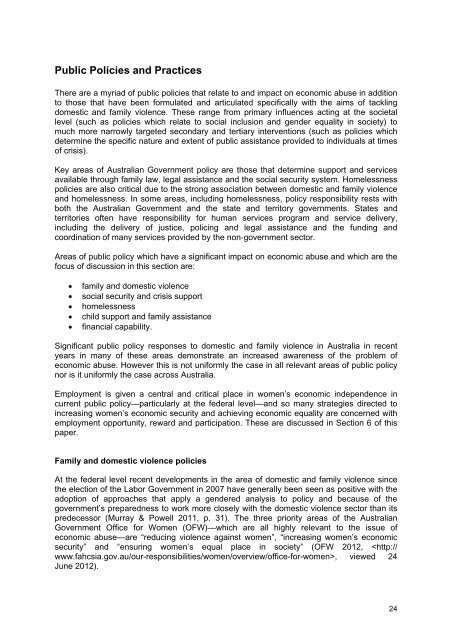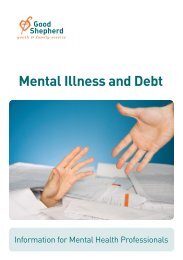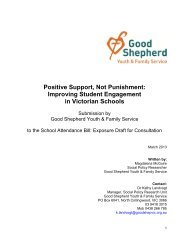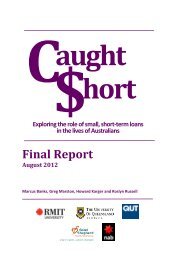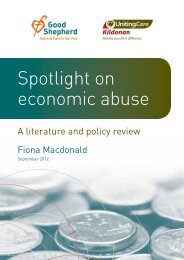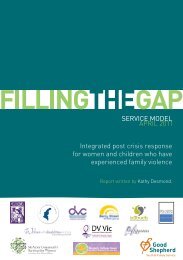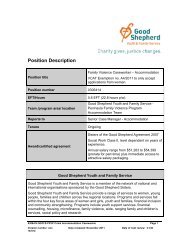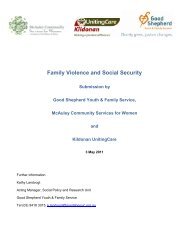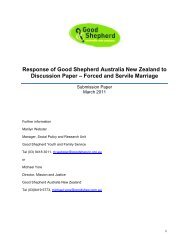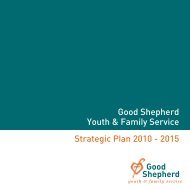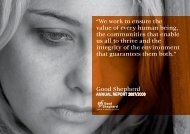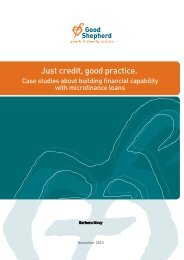Spotlight on economic abuse - Good Shepherd Youth & Family ...
Spotlight on economic abuse - Good Shepherd Youth & Family ...
Spotlight on economic abuse - Good Shepherd Youth & Family ...
You also want an ePaper? Increase the reach of your titles
YUMPU automatically turns print PDFs into web optimized ePapers that Google loves.
Public Policies and Practices<br />
There are a myriad of public policies that relate to and impact <strong>on</strong> ec<strong>on</strong>omic <strong>abuse</strong> in additi<strong>on</strong><br />
to those that have been formulated and articulated specifically with the aims of tackling<br />
domestic and family violence. These range from primary influences acting at the societal<br />
level (such as policies which relate to social inclusi<strong>on</strong> and gender equality in society) to<br />
much more narrowly targeted sec<strong>on</strong>dary and tertiary interventi<strong>on</strong>s (such as policies which<br />
determine the specific nature and extent of public assistance provided to individuals at times<br />
of crisis).<br />
Key areas of Australian Government policy are those that determine support and services<br />
available through family law, legal assistance and the social security system. Homelessness<br />
policies are also critical due to the str<strong>on</strong>g associati<strong>on</strong> between domestic and family violence<br />
and homelessness. In some areas, including homelessness, policy resp<strong>on</strong>sibility rests with<br />
both the Australian Government and the state and territory governments. States and<br />
territories often have resp<strong>on</strong>sibility for human services program and service delivery,<br />
including the delivery of justice, policing and legal assistance and the funding and<br />
coordinati<strong>on</strong> of many services provided by the n<strong>on</strong>‐government sector.<br />
Areas of public policy which have a significant impact <strong>on</strong> ec<strong>on</strong>omic <strong>abuse</strong> and which are the<br />
focus of discussi<strong>on</strong> in this secti<strong>on</strong> are:<br />
<br />
<br />
<br />
<br />
<br />
family and domestic violence<br />
social security and crisis support<br />
homelessness<br />
child support and family assistance<br />
financial capability.<br />
Significant public policy resp<strong>on</strong>ses to domestic and family violence in Australia in recent<br />
years in many of these areas dem<strong>on</strong>strate an increased awareness of the problem of<br />
ec<strong>on</strong>omic <strong>abuse</strong>. However this is not uniformly the case in all relevant areas of public policy<br />
nor is it uniformly the case across Australia.<br />
Employment is given a central and critical place in women’s ec<strong>on</strong>omic independence in<br />
current public policy—particularly at the federal level—and so many strategies directed to<br />
increasing women’s ec<strong>on</strong>omic security and achieving ec<strong>on</strong>omic equality are c<strong>on</strong>cerned with<br />
employment opportunity, reward and participati<strong>on</strong>. These are discussed in Secti<strong>on</strong> 6 of this<br />
paper.<br />
<strong>Family</strong> and domestic violence policies<br />
At the federal level recent developments in the area of domestic and family violence since<br />
the electi<strong>on</strong> of the Labor Government in 2007 have generally been seen as positive with the<br />
adopti<strong>on</strong> of approaches that apply a gendered analysis to policy and because of the<br />
government’s preparedness to work more closely with the domestic violence sector than its<br />
predecessor (Murray & Powell 2011, p. 31). The three priority areas of the Australian<br />
Government Office for Women (OFW)—which are all highly relevant to the issue of<br />
ec<strong>on</strong>omic <strong>abuse</strong>—are “reducing violence against women”, “increasing women’s ec<strong>on</strong>omic<br />
security” and “ensuring women’s equal place in society” (OFW 2012, , viewed 24<br />
June 2012).<br />
24


